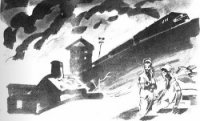Operation Nemesis: The Assassination Plot that Avenged the Armenian Genocide - Bogosian Eric (мир книг .txt) 📗
The assassination was described, moment by moment. Tehlirian did not deny stalking Talat, passing him, shooting him in the back of the head, and throwing the pistol away. The court became entangled in trying to understand why Tehlirian had walked past Talat before shooting him. They found his actions confusing because they did not understand that they were dealing with a seasoned assassin. Seen from that perspective—that Tehlirian knew what he was doing—everything Tehlirian did made sense: He tracked his victim by walking in a parallel path on the other side of the boulevard. He then hurried forward, crossed the street, and walked past Talat, getting a good look at his face so he could be absolutely certain of his victim’s identity. Immediately after passing his target, Tehlirian turned and shot Talat once in the base of his skull. He said so himself: “One shot.” Intelligence agents the world over know that absolute reliability is obtained by severing the spinal cord in the cervical region. Tehlirian’s efficiency was noted but disregarded.
Tehlirian was no amateur; his first priority was to complete his assignment. As he had explained to a police officer when he was first interrogated, shooting Talat from the front risked the possibility of Talat’s making some sort of defensive maneuver. Shooting him from behind decreased the possibility that Talat might dodge or deflect the bullet. Tehlirian’s job was to effect the man’s death, not satisfy some personal emotional need. He was clear about this.
LEHMBERG: What sort of feeling did you have when Talat Pasha was dead? What did you think at that point?
TEHLIRIAN: Right afterwards, I don’t know.
LEHMBERG: But sometime afterwards, what happened must have become clear to you?
TEHLIRIAN: After I was brought to the police station, I knew what had happened.
LEHMBERG: What did you think about the deed then?
TEHLIRIAN: I felt satisfaction in my heart.
LEHMBERG: And what about now?
TEHLIRIAN: Now as well, I’m satisfied with the deed.
LEHMBERG: Of course you know that under normal circumstances no one may take on the role of judge, even if many things have happened to him?
TEHLIRIAN: I don’t know—my mother said I had to kill Talat Pasha because he was guilty of the massacre, and my soul was so transformed I didn’t know I still was not allowed to kill.
LEHMBERG: But you certainly know that our laws forbid murder, forbid killing a human being.
TEHLIRIAN: I don’t know the law.
LEHMBERG: Does the custom of blood vengeance exist among the Armenians?
TEHLIRIAN: No.
DEFENSE ATTORNEY NIEMEYER: You said something while the crowd was beating you and you were bleeding. Can you recall what you said at the time, a statement in your defense facing the crowd?
LEHMBERG: He has indicated that he did not run away, that he saw blood flowing, and that people stood around and some grabbed hold of him. (To Tehlirian) Now, do you know if one of the onlookers who’d come running confronted you, or if perhaps you spontaneously said something to one of those people in self-defense, because you’d been grabbed hold of and beaten?
TEHLIRIAN: I said I was a foreigner and the man I’d killed was also a foreigner: What did the Germans have to do with it?
LEHMBERG: You’re supposed to have said you knew what you’d done. That it was no loss for Germany.
Tehlirian then repeated his previous words.
Character witnesses followed: the two landladies as well as Tehlirian’s non-Tashnag friends, his tutor, and his doctor. Everyone described a melancholy, sweet man who would sit alone in his room, singing to himself in the dark, a traumatized refugee who refused to talk about what had happened during the war. The young student was clean and neat, even to the point of polishing his own shoes (usually the responsibility of the landlady)—a point both Tehlirian and Frau Dittman saw fit to mention. Dittman further testified that on the day before the murder, Tehlirian had been drinking cognac and crying.
His friend Levon Eftian summed it up: “He always looked sad.”
When it was learned that Tehlirian had not mentioned sighting Talat in Berlin to any of his (non-Nemesis) Armenian cohorts, the prosecutor tried to force him to admit the logical contradiction.
LEHMBERG: Defendant, but you did run into Talat? After the encounter, why didn’t you say anything about this important event to your countrymen?
TEHLIRIAN: I thought they’d make fun of me.
LEHMBERG: Why would they do that? If Talat was generally considered the main author? Witness [Christine] Terzibachian always wanted to talk about it. Why didn’t you mention it?
TEHLIRIAN: I didn’t speak about it.
LEHMBERG: Why did you keep it to yourself?
TEHLIRIAN: I didn’t have any interest in speaking about it.
LEHMBERG: But we’re interested in this.
TEHLIRIAN: If I had spoken about it, they would have asked many questions.
LEHMBERG: You didn’t want your countrymen to become upset and assail you with curious questions?
TEHLIRIAN: I was in such a state that I didn’t want this discussed.
One more thread was left dangling.
Next to testify was Geheimer Justizrat Schulze, a jurist as well as an official, probably a reasonably high one, who had been present at Tehlirian’s arrest.
SCHULZE: I still remember the defendant’s statements rather precisely. He readily admitted having killed Talat intentionally and with premeditation. When asked for the reasons, he answered that Talat was the one responsible for having murdered his relatives, or some of his relatives, in Armenia. As a result he had decided to avenge his relatives and came here to Germany, to Berlin.
LEHMBERG: When did he make his decision?
SCHULZE: In his homeland. He bought a pistol. He tried to learn which apartment Talat was staying in, and after he succeeded, he rented a place across from him so that he could observe him furtively. He then did watch him furtively from his window, and, he indicated, when he saw Talat go out on the day in question, he took his revolver and followed him.
He said that to make sure there was no mistake, he first walked past Talat, then turned around or walked back toward him, looked him more closely in the eye, then, when he was sure, shot him from behind in the head with the revolver. This is what he indicated.
The lawyers for the defense insisted that Schulze’s testimony be thrown out. They pointed out that Tehlirian had been running a fever and his head was bandaged at the time of the questioning. Clearly he had been incoherent when he was interrogated by the court officer. Lehmberg gently questioned Tehlirian.
LEHMBERG: Defendant, on the sixteenth of March you admitted that already at that time, in nineteen fifteen, when you had to flee from Erzincan, you decided to kill Talat.
TEHLIRIAN: I don’t remember having said that.
LEHMBERG: So you didn’t mean to state that a deed planned over a long period was involved here?
TEHLIRIAN: No, how could I have said that?
LEHMBERG: But you must have actually said that then. You were questioned by the interpreter, were you not?
TEHLIRIAN: It is possible that I stated something like that, because my head was still injured and bandaged.
The defense attorneys accused the original police station interpreter of putting words in Tehlirian’s mouth, charging that he was no friend of Tehlirian’s. But apparently the opposite was true.
SCHULZE: The interpreter was very calm. But he had a pile of sweets for the prisoner—pastries, chocolate, and so forth—and asked him to help himself. I said, “What, you want to actually offer the murderer sweets?” Then he said, “What kind of murderer?! He’s a great man we all admire!”




